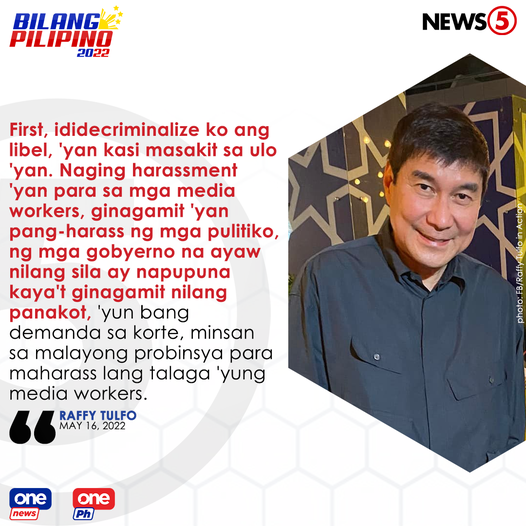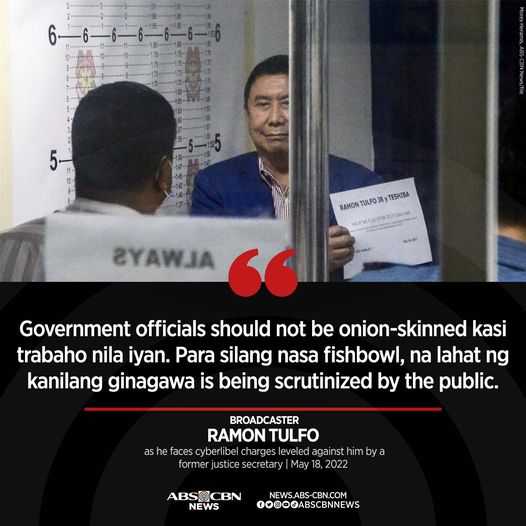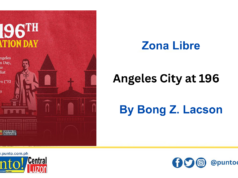“ON WHAT I can do for media workers… first I will decriminalize libel. It’s causing headaches for media workers. [Libel] is being used by politicians and those seated in the government to harass and threaten [the media].”
So was quoted presumptive senator Raffy Tulfo in an interview with The Chiefs on May 16.

“Ngayon pa lang sinasabi ko sa inyo, isa sa mga priority bills ko ay ‘yung ipa-decriminalize ‘yung libel.” So, the proclaimed senator Tulfo made an echo chamber out of the Philippine International Convention Center, May 18.
He clarified though that he does not plan to remove the civil liabilities of libel “so that those who feel that they have been affected by what they believe to be libelous can attain justice.”
“Let’s accept it, there are also people from our ranks who are crazy, who are biased in criticizing the government,” he said.
Earlier that same day, the senator’s elder sibling Ramon was arrested by police for cyber libel.

“Wala, di pa nagbabago ang aking stand. Di ito top priority, itong decriminalizing libel. Karamihan lumalapit sakin mga mahihirap nating kababayan. Sila ang uunahin ko muna. They are the reason bakit ako tumakbo sa pagkasenador.” So, Tulfo told ANC’s Headstart on May 19.
I leave that there. Draw your own opinions. I came out here to take my stand anew against decriminalizing libel, updating a piece I wrote here in February 2014 that put me at odds with a number of my media peers.
I HAVE had no problem with libel, notwithstanding the eight cases I had faced in my almost 50 years of writing. No bragging there, just being matter-of-factly.
I have always considered a libel case as par for the course in the journalism field.
As a recourse – the only legal one – of anyone who felt maligned in print, broadcast, or personal utterance, to seek redress for her/his grievance. Indeed, the exercise of a civil right in our democratic state.
It is precisely owing to this core belief that I never begrudged all those people who took me to court – mainly to the prosecutor’s office – crying that I libeled them.
I respected their right to seek my comeuppance for whatever perceived and felt wrong I did them. I respected them for their civility – of going the judicial course instead of taking the extra-judicial route with extreme prejudice.
It is precisely because no libel complaint bearing my name as respondent ever prospered, all finding closure at the prosecutor’s office, that I have lived well with the reality of libel – until 2010.
Mid-December of that year, a complaint rising out of my reply to a story denigrating procedures in the conferment of some awards went beyond the prosecutor’s, after its dismissal and subsequent denial of a motion for reconsideration there, to the Department of Justice via the complainant’s petition for review. Only to be dismissed anew. The case ran all of three years. Meaning not to scratch old scars to draw fresh blood anew, I made no mention of names and circumstances here. A slew of stories about it came out in the local media and I recorded my personal account in acaesar.blogspot.com.
20 years ‘warranted’
In November 2015, a libel complaint I did not know still existed came to my knowledge only when I sought an NBI clearance relative to the renewal of my gun permit and found an alias warrant to my name. The case was filed in 1997. Alas, two co-respondents – publisher Joe Pavia and editor Ody Fabian – had died since.
I hastened to Angeles City RTC Branch 62 to post bail and seek the reopening of the case.
The ink on my fingers and my palms from posting bail had yet to be completely scrubbed off when I got a subpoena from the Provincial Prosecutor’s Office for another libel complaint. A Guagua cop felt maligned by a story in Punto! in August 2015 written by the erudite Ding Cervantes alleging irregularities in the handling of evidence obtained in drug buy-bust. As editor, I was co-respondent.
The 1997 case filed by husband-and-wife officers of the Mabalacat Water District was dismissed in August 2016 “for lack of interest to prosecute” as the complainants could not be found anymore. What dragged on – absent my knowledge – for all of 20 years took but two hearings to be scratched off the court archives.

People vs. Cervantes, Lacson et al did not go beyond pre-trial for over three years, the complainant showing himself in court all of three times. Raffled off thereafter to another judge, the case was “conditionally dismissed” in August 2020 after only three hearings.
Grand celebrations
Any dismissal of a libel case is a cause for grand celebrations, as much for the personal triumph of the writer-respondent and his paper or radio-TV station, as for the victory of justice, and the supremacy of press freedom.
At the time of our prime, not too long ago, libel cases were never considered swords of Damocles hanging over our heads in our daily journalistic grind, but rather areas of opportunity to test the bounds of the freedom of expression. The possibility of libel cases never deterred us from the pursuit of the story, any story fit to print, to appropriate the hallowed motto of The New York Times.
No fear factor, no “chilling effect” then as now did a libel case serve as prior restraint in our exercise of this profession.
Feeling safeguarded as we were by Justice Malcolm, writing in United States v. Bustos, 37 Phil. 731, 740, 741, to wit:
“The interest of society and the maintenance of good government demand a full discussion of public affairs. Complete liberty to comment on the conduct of public men is a scalpel in the case of free speech. The sharp incision of its probe relieves the abscesses of officialdom. Men in public life may suffer under a hostile and unjust accusation; the wound can be assuaged with the balm of clear conscience. A public officer must not be too onion-skinned with reference to comment upon his official acts. Only thus can intelligence and dignity of the individual be exalted. Of course, criticism does not authorize defamation. Nevertheless, as an individual is less than the state, so must criticism be borne for the public good.”
(Part 2 tomorrow)





